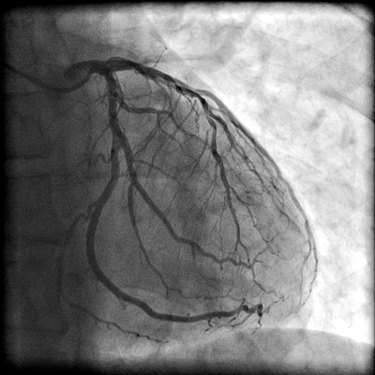
Experiencing pain in your heart and chest area can be alarming no matter when it occurs. If you experience this pain right after eating, it's most likely due to heartburn; however, knowing the warning signs of a heart attack may help save your life. You should never take any type of pain in the chest lightly. If you experience heart pain after eating, the safest thing to do is seek medical attention.
Harrowing Heartburn
Video of the Day
When you swallow food, it moves down your esophagus into your stomach through a band of muscles called the lower esophageal sphincter. The LES relaxes to allow food to pass into the stomach and then constricts to prevent food and digestive juices from flowing backwards into your esophagus. Heartburn occurs when the LES relaxes or becomes weak, allowing stomach acid to flow into the esophagus. Overeating can put pressure on the LES, making heartburn more likely. Heartburn may also occur as a result of lying down too soon after eating or from certain foods such as spicy foods, fatty foods and caffeine. In addition to pain in the chest area, heartburn may also cause a burning sensation in the throat and a sour taste in your mouth.
Video of the Day
A Word on GERD
If you experience heart pain on a regular basis after you eat something, you may have gastroesophageal reflux disease. The National Digestive Diseases Information Clearinghouse defines GERD as chronic acid reflux that occurs more than twice a week for at least a few weeks. The main symptom of GERD is heartburn. Other symptoms include chest pain, wheezing, nausea, vomiting, sore throat, bad breath, wheezing and a chronic, dry cough. If left untreated, GERD can lead to serious complications, including bleeding of the esophagus, respiratory problems and esophageal strictures. If you think you may have GERD, speak to your doctor about the best ways for you to get the condition under control.
Other Digestive Dilemmas
Heartburn and GERD aren't the only digestive issues that can cause pain in the heart area after eating. An esophageal spasm, indigestion or a gallbladder attack can have the same effect. A gallbladder attack, which is characterized by pain in the chest, nausea and an ache in the abdomen, is more likely to occur right after a fatty meal, according to CNN.com.
Serious Warning Signs
Although the heart pain you experience after eating is most likely related to a digestive problem, it should not be taken lightly. Signs of a heart attack include sudden pressure or a squeezing pain in the center of the chest that persists for more than a few minutes, shortness of breath, chest discomfort, sweating, lightheadedness, dizziness and nausea. The chest pain associated with a heart attack may spread to your back, neck, shoulders, jaw, stomach and arms -- especially the left arm. If you suspect you're having a heart attack, seek emergency medical attention immediately.
- Better Health Channel: Chest Pain
- Clinical Methods: The History, Physical, and Laboratory Examinations
- Columbia University Go Ask Alice: Sharp Chest Pains -- Heart Attack? Stress? Heartburn?
- CNN.com: Heartburn or Chest Pain: When Is It a Heart Attack?
- National Digestive Diseases Information Clearinghouse: Gastroesophageal Reflux (GER) and Gastroesophageal Reflux Disease (GERD) in Adults